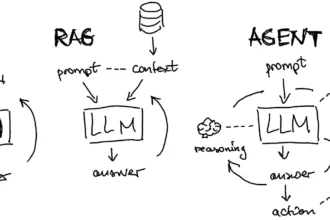In an age where the retail landscape is evolving at the speed of light, generative AI emerges as a powerful navigator, reshaping how consumers and brands interact. Imagine stepping into a store where your every need is anticipated—thanks to AI-driven virtual shopping assistants that curate personalized recommendations, making your experience as tailored as a bespoke suit. At the forefront of this revolution is Walmart, harnessing AI to simplify associates’ tasks and abide by a Responsible AI Pledge that emphasizes ethical development.
From dynamically adjusting inventory to creating trend-based product designs, generative AI not only streamlines operations but also enhances customer connections. As retailers embrace this innovative wave, the possibilities seem endless, promising a future where shopping becomes a truly personalized adventure.
Table of Contents
ToggleEnhancing Retail Through AI Innovation
- Virtual shopping assistants enhance customer experience with personalized product recommendations and guidance.
- Walmart’s AI-powered personal assistant ‘My Assistant’ has been rolled out to simplify tasks for associates.
- Walmart’s Responsible AI Pledge outlines six key principles for ethical AI development and deployment in retail.
Our Interpretation
The integration of virtual shopping assistants, exemplified by Walmart’s “My Assistant,” marks a significant shift towards enhancing the retail experience through AI-driven innovation. By providing personalized product recommendations and guidance, these virtual assistants not only improve customer satisfaction but also streamline tasks for associates, ultimately contributing to a more efficient and engaging retail environment. Furthermore, Walmart’s commitment to responsible AI development and deployment, as outlined in their six key principles, underscores the company’s dedication to harnessing the power of AI while upholding ethical standards in retail practices.
Transformative Insights on Generative AI in Retail
- Generative AI adjusts inventory levels dynamically to respond to changing market demands.
- Generative AI can create new product designs based on market trends and customer interactions.
- Retailers can use generative AI to automate content creation, improving SEO and driving engagement.
- Personalized marketing with generative AI increases campaign effectiveness by predicting individual customer preferences.
- Product recommendations using generative models suggest alternative products based on buying history and preferences.
- Generative AI helps forecast demand for products, reducing overstock and stockout instances in inventory management.
- Customer service automation with generative AI increases efficiency and reduces human customer service representative workload.
- eBay ShopBot is a personal shopping assistant that uses generative AI to offer tailored suggestions.
- Shopify Magic employs automatic text generation using artificial intelligence to automate content creation processes.
- Generative AI applications in retail can reduce costs, increase efficiency, and improve customer experiences.
- Generative AI can create highly personalized content and recommendations for individual customers
- Personalized experiences enhance customer loyalty and lead to higher sales
- Generative AI fosters innovation in product design and development based on market trends and preferences
- AI powering retail industry use cases with multi-modal algorithms for customer review summaries and personalisation features.
- Generative AI empowers brands to craft customized experiences, design exclusive products, and predict consumer preferences more accurately.
- Transformative applications of generative AI in retail include creative assistance, conversational commerce, product catalog management, demand forecasting, and customer loyalty.
- Generative AI can receive tailored product recommendations, optimize inventory management and supply chains, enhance product page descriptions and images, and improve customer retention through personalized experiences.
- Top use cases for generative AI in retail include personalized product recommendations, optimized inventory management, enhanced product page descriptions and images, improved customer retention, and streamlined supply chain management.
- Generative AI optimizes product descriptions for improved digital shelf visibility and SEO rankings.
- Generative AI algorithms detect and prevent fraudulent activities, protecting brand identity and profit margins.
- Data quality and bias are significant challenges for businesses deploying generative AI models successfully.
- The interpretability and reliability of generative AI models pose risks for businesses requiring justification.
- Generative AI enables retailers to proactively stay ahead of trends, optimize spending, and foster innovation effectively.
- eBay is leveraging generative AI to streamline product listing process for third-party sellers with AI-generated descriptions.
- Retailers face risks and challenges when rolling out generative AI processes and experiences, including regulation and consumer backlash.
- Generative AI models like Gemini and GPT can transform retail industry with tailored product recommendations
- Instant product image creation using gen AI eliminates need for expensive professional photography
- Smarter product search powered by gen AI returns more relevant and precise results for customers
- Cutting-edge fraud detection with gen AI identifies patterns of fraudulent behavior and raises red flags
- Generative AI models offer innovative solutions for personalized customer experiences and inventory management.
- Reports indicate that auto-resolution rates have risen by 84% using Generative AI for HR, IT, product catalog management, and store support.
- Generative AI can craft or refine product descriptions within the knowledge base, enhancing customer experience with more engaging information.
- Generative AI enhances customer experience with personalized offers and accurate product recommendations.
- Personalization is an effective marketing technique that can be enhanced by generative AI.
- Customer loyalty is created by going above and beyond competition with excellent service.
- Generative AI analyzes customer behavior to create accurate and offered personalized products and offers.
- Generative AI rapidly analyzes vast volumes of customer data for actionable insights.
- Synthetic data generated by generative AI simulates various customer scenarios for tailored responses.
- Generative AI streamlines data analysis, enhances customer relationship management, and optimizes business performance.
- Market research using Generative AI can analyze vast amounts of text to understand market patterns.
- Generative AI can research underserved markets, giving a clear advantage in the industry.
Our Interpretation
The integration of generative AI in retail has unlocked transformative insights that are revolutionizing the industry. By dynamically adjusting inventory levels to respond to changing market demands, creating new product designs based on market trends and customer interactions, and automating content creation, retailers can now provide highly personalized experiences that enhance customer loyalty and lead to higher sales. Furthermore, generative AI fosters innovation in product design and development, empowers brands to craft customized experiences, and predicts consumer preferences more accurately. As a result, top use cases for generative AI in retail include personalized product recommendations, optimized inventory management, enhanced product page descriptions and images, improved customer retention, and streamlined supply chain management.
Leveraging AI and Personalization in Retail Insights
- 74.7% of consumers are more likely to make repeat purchases from more personalized brands
- 11% of clients want online retail chatbots to reach the sophistication level of ChatGPT
- 48% of retail leaders foresee AI, ML, and CV as top technologies for retail industry in 3-5 years
- 60% of retailers plan to adopt these technologies next year for better in-store and online experiences
- 66% of retailers consider Generative AI application in personalized recommendations
- 64% of retailers use Generative AI for trend analysis and inventory management
- 53% of retailers use Generative AI for automatic product description generation
- 28% of retailers use Generative AI for AI-driven virtual try-ons
- 21% of retailers use Generative AI for faster product design and development
- 70% of leaders predominantly prioritize Generative AI in marketing and sales
- Generative AI in retail market expected to grow at CAGR of 10.4% from 2023 to 2028.
Our Interpretation
The retail industry is on the cusp of a revolution, driven by the confluence of Artificial Intelligence (AI), Machine Learning (ML), and Computer Vision (CV). As consumers increasingly crave personalized experiences, retailers are adapting by embracing these technologies to stay ahead. The statistics are telling: 74.7% of consumers are more likely to make repeat purchases from brands that tailor their offerings to individual preferences.
Retail leaders are taking notice, with 48% foreseeing AI, ML, and CV as top technologies for the industry in the next three to five years. The majority (60%) plan to adopt these innovations next year to enhance both online and offline experiences. Generative AI is at the forefront of this shift, with 66% of retailers considering its application in personalized recommendations, and 64% using it for trend analysis and inventory management.
The implications are clear: retailers that fail to adapt will be left behind. The market for Generative AI in retail is expected to grow at a staggering 10.4% Compound Annual Growth Rate (CAGR) from 2023 to 2028, driven by the increasing demand for sophisticated online chatbots and the need for faster product design and development. As leaders prioritize Generative AI in marketing and sales, it’s clear that this technology will be the driving force behind the retail industry’s transformation.
Transformative AI Innovations in Retail Supply Chains
- AI-powered technologies optimize inventory levels for maximum efficiency in retail supply chains.
- Demand forecasting data enables ideal inventory levels, fine-tuning supply chain operations.
- Chatbots provide 24/7 customer support, efficiently handling inquiries and resolving common issues.
- AI-powered chatbots transform vendor negotiations in retail, achieving 68% supplier deal closure for Walmart.
- Carrefour’s ChatGPT-based intelligent assistance chatbot Hopla offers real-time product suggestions and reliable support.
- Newegg integrates ChatGPT into various operations, including customer service chat and text content optimization.
- Conversational virtual assistants powered by generative AI guide customers through the purchasing process.
- AI-powered chatbots provide 24/7 customer service, improving satisfaction and issue resolution
- AI-driven price monitoring and adjustments help retailers avoid losing customers to competitors effectively.
- Chatbots created with generative AI enhance customer service, reduce workload on human representatives efficiently.
- Retailers must navigate evolving customer expectations, competition, and price sensitivity with advanced tools like AI.
- Predictive inventory management capabilities of gen AI optimize stock levels and reduce overstocking or understocking
- Conversational AI Bots for Seamless Interactions powered by gen AI handle customer inquiries and complex processes
- Streamlined supply chain operations with gen AI predictive analytics ensure smoother and more efficient logistics
- AI-driven applications enhance customer service and efficiency while fostering a deeper connection with consumers.
- ChatGPT-powered chatbots provide instant answers to basic questions, making self-service options superior for customers.
- Conversational commerce AI platforms streamline order management, returns, and shipping details automatically.
- Intelligent Order Management systems reduce costs and improve inventory management through automation.
- Real-time resolution of customer data and queries is expected, but often fails to meet demand.
- Machine learning techniques process unstructured data from customer reviews and chat logs efficiently.
- Conversational AI generates return labels automatically and helps resolve issues for hassle-free returns.
Our Interpretation
The integration of AI-powered technologies in retail supply chains has revolutionized the way businesses operate, optimize inventory levels, and provide seamless customer experiences. By leveraging demand forecasting data, chatbots, and conversational virtual assistants, retailers can fine-tune their supply chain operations, achieve higher supplier deal closure rates, and enhance customer satisfaction through efficient issue resolution. Moreover, AI-driven price monitoring and adjustments enable retailers to stay competitive, while predictive inventory management capabilities optimize stock levels and reduce overstocking or understocking. As the retail landscape continues to evolve, embracing advanced tools like generative AI will be crucial for navigating changing customer expectations, competition, and price sensitivity.
Enhancing Customer Experience Through AI-Driven Insights
- AI streamlines shopping experiences at Newegg with concise ‘Review Bytes’ summaries of customer reviews.
- Amazon’s AI-generated customer review summaries enable buyers to make informed decisions without sifting through reviews.
- AiseraGPT can write knowledge-base articles to start, requiring editing but saving time and energy.
Our Interpretation
The integration of artificial intelligence (AI) in e-commerce platforms is revolutionizing the way customers interact with products and services. By leveraging AI-driven insights, companies like Newegg and Amazon are able to provide concise and informative summaries of customer reviews, empowering buyers to make informed decisions without getting bogged down in lengthy feedback. Furthermore, AI tools such as AiseraGPT are streamlining content creation processes by generating knowledge-base articles that can be edited and refined, saving time and energy for businesses looking to scale their online presence. This synergy between humans and machines is redefining the customer experience, making it more personalized, efficient, and effective.





